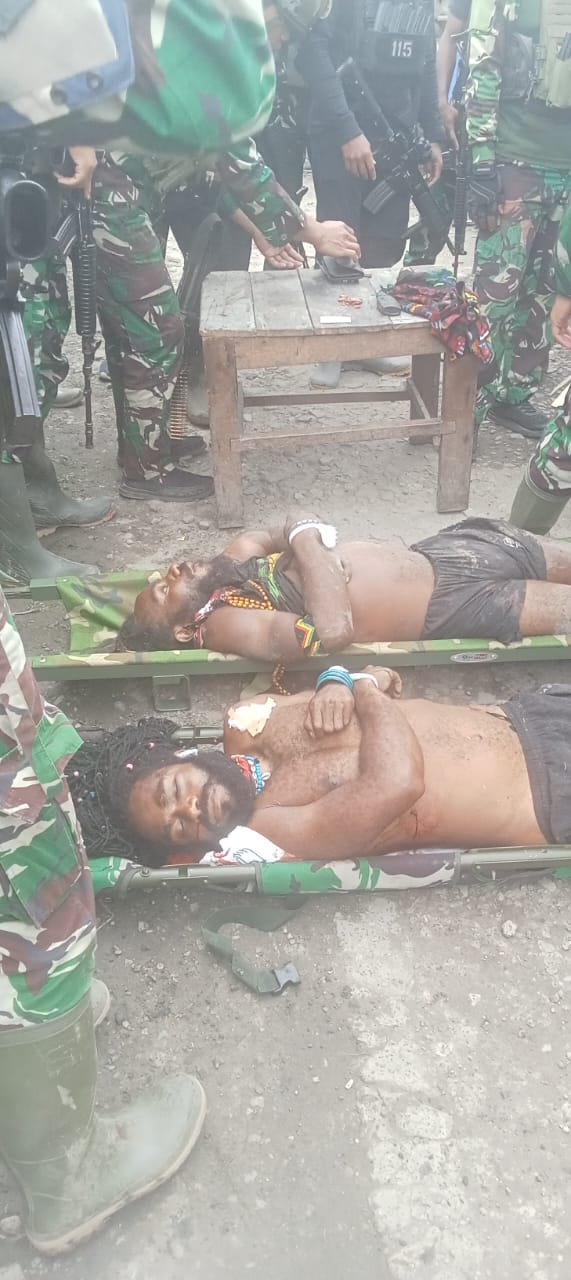Clash in Papua: Two Separatists from OPM Gunned Down by Indonesian Forces
PAPUA, RAKYAT NEWS – A violent gunfight erupted between the Free Papua Movement (OPM) and security forces in Sinak, Puncak Jaya Regency, Papua.
The clash led to the deaths of two members of the OPM, who were reportedly part of a group led by Lekagak Telenggeng.
The two deceased OPM members were identified as Patius Telenggeng, a 35-year-old from Rumagi in Mage Bume District, while the second individual’s identity remains unknown.
The confrontation occurred in the market area of Kampung Gigobak 1 in Sinak. Security forces recovered crucial evidence at the scene, including a revolver, three 9mm rounds of ammunition, and a mobile phone, which were reportedly left behind by the fleeing assailants.
The deadly encounter began at around 1:25 PM local time when authorities responded to reports of a potential OPM presence in the area.
Earlier intelligence from local sources had indicated the arrival of a group led by Lekagak Telenggeng, known for their distinct appearance — tall with dreadlocked hair, wearing black and brown clothing, and carrying short-barreled firearms.
In response, local military and police units were put on high alert and began patrolling Sinak to locate the group.
The situation turned tense when, at around 1:20 PM, a patrol led by Lieutenant Drg Kharis Surya Santika spotted individuals matching the description at a small grocery shop in Sinak. When the security forces approached, one of the suspected OPM members immediately opened fire on Lieutenant Santika, who was positioned behind the Mandala V task force post.
As the situation escalated, Colonel CZI Dendi intervened by advising the shop owner to evacuate the area and take shelter at a nearby mosque. Meanwhile, the two OPM members, cornered and under pressure, took refuge under the counter of the store. Security forces called for them to surrender, but they refused to comply.
Despite issuing several warnings, the suspects remained defiant. One of them attempted to flee, forcing security forces to take more aggressive measures. This action resulted in a fatal confrontation when the OPM member failed to heed further warnings. Another suspect remained hidden inside the shop, and efforts to persuade him to surrender were unsuccessful.
After the conflict subsided and the area was secured, a search operation was conducted around the shop. During this operation, authorities discovered the revolver left by the fleeing suspect under the counter of the store. The incident marks another violent chapter in the ongoing conflict between security forces and separatist groups in the Papua region.
The local authorities are continuing their investigation into the incident and are working to confirm the identity of the second OPM member involved in the clash. This encounter adds to the ongoing tensions in the region, where clashes between the Indonesian military and separatist groups have been a persistent issue.
The Papua Indonesia rebellion refers to the ongoing conflict in the Papua region, which has sought independence from Indonesia since the area became part of the country in 1969. Papua, the western half of New Guinea, was integrated into Indonesia following the controversial “Act of Free Choice” referendum. The referendum, widely criticized for being manipulated, resulted in Papua’s annexation despite significant opposition from its indigenous population. Since then, the region has seen persistent demands for independence, with the Free Papua Movement (OPM) becoming the primary group advocating for self-determination.
The rebellion is marked by sporadic violence, guerrilla warfare, and confrontations between the Indonesian military and separatist forces. Indigenous Papuans, who are ethnically distinct from most Indonesians, have voiced grievances over economic inequality, human rights violations, environmental degradation from resource exploitation, and lack of political representation. These tensions have been fueled by the Indonesian government’s heavy military presence in the region, and there have been numerous reports of human rights abuses committed by security forces, such as extrajudicial killings and torture.
Although some Papuans continue to seek full independence, others call for increased autonomy within Indonesia. The Indonesian government remains steadfast in its commitment to maintaining control over Papua, considering the region an integral part of the nation. Despite attempts to resolve the conflict through limited autonomy measures, many Papuans view these efforts as insufficient. The rebellion remains a complex issue with no clear resolution, as both the Papuan desire for self-determination and Indonesia’s sovereignty claims continue to clash. (Uki Ruknuddin)


Tinggalkan Balasan Batalkan balasan